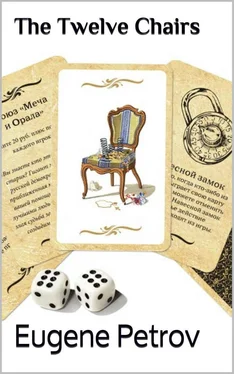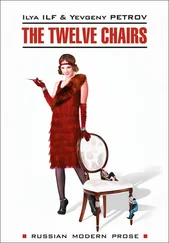Eugene Petrov - The Twelve Chairs
Здесь есть возможность читать онлайн «Eugene Petrov - The Twelve Chairs» весь текст электронной книги совершенно бесплатно (целиком полную версию без сокращений). В некоторых случаях можно слушать аудио, скачать через торрент в формате fb2 и присутствует краткое содержание. Год выпуска: 2013, Жанр: Юмористическая проза, на английском языке. Описание произведения, (предисловие) а так же отзывы посетителей доступны на портале библиотеки ЛибКат.
- Название:The Twelve Chairs
- Автор:
- Жанр:
- Год:2013
- ISBN:нет данных
- Рейтинг книги:5 / 5. Голосов: 1
-
Избранное:Добавить в избранное
- Отзывы:
-
Ваша оценка:
- 100
- 1
- 2
- 3
- 4
- 5
The Twelve Chairs: краткое содержание, описание и аннотация
Предлагаем к чтению аннотацию, описание, краткое содержание или предисловие (зависит от того, что написал сам автор книги «The Twelve Chairs»). Если вы не нашли необходимую информацию о книге — напишите в комментариях, мы постараемся отыскать её.
Find traces of a separate headset difficult and heroes face different adventures and troubles.
The Twelve Chairs — читать онлайн бесплатно полную книгу (весь текст) целиком
Ниже представлен текст книги, разбитый по страницам. Система сохранения места последней прочитанной страницы, позволяет с удобством читать онлайн бесплатно книгу «The Twelve Chairs», без необходимости каждый раз заново искать на чём Вы остановились. Поставьте закладку, и сможете в любой момент перейти на страницу, на которой закончили чтение.
Интервал:
Закладка:
night before, Ippolit Matveyevich counted up his cash-in-hand, locked the
house, put the key in his back pocket and took the no. 7 express to
Stargorod.
CHAPTER FIVE
THE SMOOTH OPERATOR
At half past eleven a young man aged about twenty-eight entered
Stargorod from the direction of the village of Chmarovka, to the north-east.
A waif ran along behind him.
"Mister!" cried the boy gaily, "gimme ten kopeks!"
The young man took a warm apple out of his pocket "and handed it to the
waif, but the child still kept running behind. Then the young man stopped
and, looking ironically at the boy, said quietly:
"Perhaps you'd also like the key of the apartment where the money is?"
The presumptuous waif then realized the complete futility of his
pretensions and dropped behind.
The young man had not told the truth. He had no money, no apartment
where it might have been found, and no key with which to open it. He did not
even have a coat. The young man entered the town in a green suit tailored to
fit at the waist and an old woollen scarf wound several times around his
powerful neck. On his feet were patent-leather boots with orange-coloured
suede uppers. He had no socks on. The young man carried an astrolabe.
Approaching the market, he broke into a song: "O, Bayadere, tum-ti-ti,
tum-ti-ti."
In the market he found plenty going on. He squeezed into the line of
vendors selling wares spread out on the ground before them, stood the
astrolabe in front of him and began shouting:
"Who wants an astrolabe? Here's an astrolabe going cheap. Special
reduction for delegations and women's work divisions !"
At first the unexpected supply met with little demand; the delegations
of housewives were more interested in obtaining commodities in short supply
and were milling around the cloth and drapery stalls. A detective from the
Stargorod criminal investigation department passed the astrolabe-vendor
twice, but since the instrument in no way resembled the typewriter stolen
the day before from the Central Union of Dairy Co-operatives, the detective
stopped glaring at the young man and passed on.
By lunchtime the astrolabe had been sold to a repairman for three
roubles.
"It measures by itself," he said, handing over the astrolabe to its
purchaser, "provided you have something to measure."
Having rid himself of the calculating instrument, the happy young man
had lunch in the Tasty Corner snack bar, and then went to have a look at the
town. He passed along Soviet Street, came out into Red Army Street
(previously Greater Pushkin Street), crossed Co-operative Street and found
himself again on Soviet Street. But it was not the same Soviet Street from
which he had come. There were two Soviet Streets in the town. Greatly
surprised by this fact, the young man carried on and found himself in Lena
Massacre Street (formerly Denisov Street). He stopped outside no. 28, a
pleasant two-storeyed private house, which bore a sign saying:
USSR RSFSR
SECOND SOCIAL SECURITY HOME
OF THE
STAR-PROV-INS-AD
and requested a light from the caretaker, who was sitting by the
entrance on a stone bench.
"Tell me, dad," said the young man, taking a puff, "are there any
marriageable young girls in this town? "
The old caretaker did not show the least surprise.
"For some a mare'd be a bride," he answered, readily striking up a
conversation.
"I have no more questions," said the young man quickly. And he
immediately asked one more: "A house like this and no girls in it?"
"It's a long while since there've been any young girls here," replied
the old man. "This is a state institution-a home for old-age women
pensioners."
"I see. For ones born before historical materialism?"
"That's it. They were born when they were born."
"And what was here in the house before the days of historical
materialism?"
"When was that?"
"In the old days. Under the former regime."
"Oh, in the old days my master used to live here."
"A member of the bourgeoisie")"
"Bourgeoisie yourself! I told you. He was a marshal of the nobility."
"You mean he was from the working class?"
"Working class yourself! He was a marshal of the nobility."
The conversation with the intelligent caretaker so poorly versed in the
class structure of society might have gone on for heaven knows how long had
not the young man got down to business.
"Listen, granddad," he said, "what about a drink?"
"All right, buy me one!"
They were gone an hour. When they returned, the caretaker was the young
man's best friend.
"Right, then, I'll stay the night with you," said the newly acquired
friend.
"You're a good man. You can stay here for the rest of your life if you
like."
Having achieved his aim, the young man promptly went down into the
caretaker's room, took off his orange-coloured boots, and, stretching out on
a bench, began thinking out a plan of action for the following day.
The young man's name was Ostap Bender. Of his background he would
usually give only one detail. "My dad," he used to say, "was a Turkish
citizen." During his life this son of a Turkish citizen had had many
occupations. His lively nature had prevented him from devoting himself to
any one thing for long and kept him roving through the country, finally
bringing him to Stargorod without any socks and without a key, apartment, or
money.
Lying in the caretaker's room, which was so warm that it stank, Ostap
Bender weighed up in his mind two possibilities for a career.
He could become a polygamist and calmly move on from town to town,
taking with him a suitcase containing his latest wife's valuables, or he
could go the next day to the Stargorod Commission for the Improvement of
Children's Living Conditions and suggest they undertake the popularization
of a brilliantly devised, though yet unpainted, picture entitled "The
Bolsheviks Answer Chamberlain" based on Repin's famous canvas "The Zaporozhe
Cossacks Answer the Sultan". If it worked, this possibility could bring in
four hundred or so roubles.
The two possibilities had been thought up by Ostap during his last stay
in Moscow. The polygamy idea was conceived after reading a law-court report
in the evening paper, which clearly stated that the convicted man was given
only a two-year sentence, while the second idea came to Bender as he was
looking round the Association of Revolutionary Artists' exhibition, having
got in with a free pass.
Both possibilities had their drawbacks, however. To begin a career as a
polygamist without a heavenly grey polka-dot suit was unthinkable. Moreover,
at least ten roubles would be needed for purposes of representation and
seduction. He could get married, of course, in his green field-suits, since
his virility and good looks were absolutely irresistible to the provincial
belles looking for husbands, but that would have been, as Ostap used to say,
"poor workmanship". The question of the painting was not all plain sailing
either. There might be difficulties of a purely technical nature. It might
be awkward, for instance, to show Comrade Kalinin in a fur cap and white
cape, while Comrade Chicherin was stripped to the waist. They could be
depicted in ordinary dress, of course, but that would not be quite the same
thing.
"It wouldn't have the right effect!" said Ostap aloud.
At this point he noticed that the caretaker had been prattling away for
Читать дальшеИнтервал:
Закладка:
Похожие книги на «The Twelve Chairs»
Представляем Вашему вниманию похожие книги на «The Twelve Chairs» списком для выбора. Мы отобрали схожую по названию и смыслу литературу в надежде предоставить читателям больше вариантов отыскать новые, интересные, ещё непрочитанные произведения.
Обсуждение, отзывы о книге «The Twelve Chairs» и просто собственные мнения читателей. Оставьте ваши комментарии, напишите, что Вы думаете о произведении, его смысле или главных героях. Укажите что конкретно понравилось, а что нет, и почему Вы так считаете.












